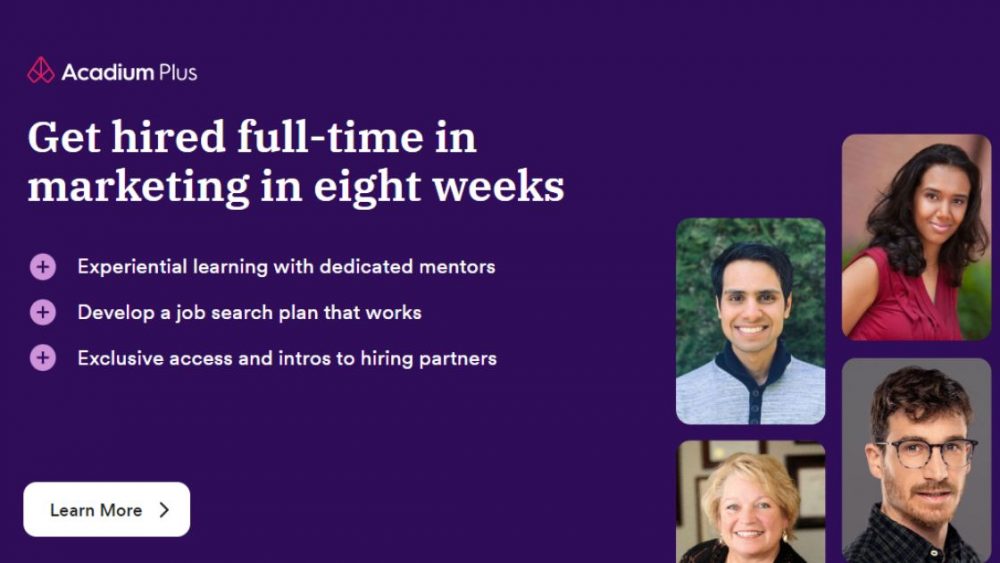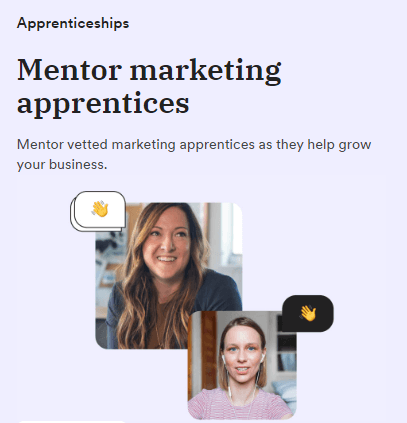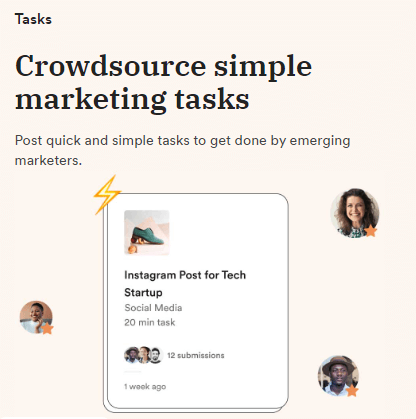Disclosure: This article may contain affiliate links, meaning that when you make a purchase, I earn a small commission. Affiliate links cost you nothing to use and help keep my content free. For more info, see the Disclosure Policy.
Mentorship programs are a great way to get hands-on experience in your desired field. Not only do you learn from those who have been in the industry for years, but you also make valuable connections that can help you throughout your career.
I have personally sought out a mentor to gain more work experience. I took a few digital marketing courses on Acadium and applied for a social media and content writing role, which I added to my resume. I have also had a blogging mentor, and I now benefit from frequent coaching.
I can understand the benefit of being part of a mentorship program to gain some real-world experience that can move you one step closer to your goals, which is why I wanted to discuss it in today’s article.
Hopefully, by now, you have had a teacher, coach, or boss who believed in you and helped you develop your skills. A mentor relationship is similar and typically focused on your professional development.
If you’re looking for a mentor or want to become a mentor, here are some tips to get started.

What is a Mentorship Program?
A mentorship program is a partnership between a mentor and a mentee. The mentor is someone with more experience in the field than the mentee, and their goal is to help the mentee learn and grow in their chosen profession. The mentee is typically someone just starting out in their chosen field, and they look to the mentor for guidance and advice.
Mentoring programs can often be found in professional organizations, but they can also be found in schools, universities, and even informally between two individuals.
How Can I Find a Mentor?
There are a few different ways to find a mentor. One way is to reach out to someone you admire or respect in your chosen field and ask if they would be willing to mentor you. Another way is to look for mentorship programs at your job, school, or within your community. There are many mentorship programs available online as well.
If you’re unsure where to start, try searching for “mentorship program” + your city, industry, or desired field on Google. This should give you a good starting point for finding a mentorship program that’s right for you.
What Should I Look for in a Mentor?
When looking for a mentor, it’s important to find someone with extensive knowledge and experience in the field you’re interested in. A mentor should be someone you can trust and feel comfortable talking to about your goals, challenges, and successes.
Another thing to consider is whether you want a formal or informal mentorship. A formal mentorship program will likely have rules and guidelines that you’ll need to follow. An informal mentorship may be more flexible and involve a family friend or community member as a mentor.
How Can I Be a Good Mentee?
Being a good mentee involves being open to learning from your mentor and taking their advice. It’s also important to be respectful of their time and energy and to be grateful for the guidance they’re providing.
It’s helpful to keep in mind that your mentor is there to help you grow, so don’t be afraid to ask questions or look for support when you need it.
How Can I Become a Mentor?
If you’re interested in becoming a mentor, you can do a few things to get started. First, reach out to someone you know who might benefit from a mentorship program and offer to mentor them. You can also find mentorship programs seeking mentors or start your own mentorship program.
Mentors should be empathetic, respectful, good listeners, and have a genuine desire to help others grow and succeed. If you have these qualities and are passionate about your chosen field, you’re well on your way to becoming an excellent mentor.
The Benefits of Participating in a Mentorship Program
Mentorship programs offer several benefits for both mentors and mentees. Some of the main benefits of mentorship programs:
- Gain a better understanding of others’ perspectives
- Promote a culture of learning
- Build relationships and networking opportunities
- Have a better attitude to work
- Improve self-esteem while making a difference
- Improve retention rates within an organization
- Prevent isolation and loneliness
- Promote diversity and inclusion
- Improve communication, listening, and leadership skills
- Achieve personal and professional growth
- Strengthen the corporate culture
Ultimately, mentorship can be a beneficial experience for all parties involved. Mentees can reap the benefits mentioned above by having access to senior leaders. Those who take the time to mentor junior staff or learners develop leadership skills and give them fresh perspectives.
How to Design a Mentorship Program
If you work in the L&D department of an organization, you may want to design a mentorship program as a way of training new employees.
When designing a mentorship program, it’s important to consider the program’s goals and who will be participating. Once you have a clear understanding of these things, you can start to put together a program that will be successful.
Some things to consider when designing a mentorship program:
1. The purpose of the program: What are the goals of the mentorship program? Is it to help employees develop leadership skills? To provide support for new employees? To promote diversity and inclusion?
2. Who will participate: Will the program be open to all employees or certain departments? Is there an application or invite involved? How many mentors and mentees will partake?
3. What type of mentorship relationships will be established: Will mentors and mentees be matched randomly, or will they get to choose who they work with? How long will the relationship last? Will it be one-to-one, group, or project-based?
4. What kind of support will be offered: What resources will be available to mentors and mentees? Will there be training or orientation sessions? What kind of mentoring style will be incorporated?
5. How to encourage participation: What might stop the mentors from pursuing such a program, and how can we encourage them? What are the benefits of participating? Will there be any incentives offered?
6. Measurement and evaluation: How will you know if the mentorship program is successful? What metrics will you use to evaluate progress?
Mentorship training will need to be provided to the participants to ensure that they can support each other properly. The training should cover topics such as how to be an effective mentor, the expectations of a mentor-mentee relationship, and how to resolve any conflicts that may arise.
Creating a safe and supportive environment for all participants is also important. This means establishing clear guidelines and boundaries for the program, as well as having a mechanism in place for addressing any concerns or complaints.
My Mentorship Experience at Acadium
Acadium, formerly known as GenM, is a platform that offers apprenticeships to help people learn new skills and launch their careers. I participated in their Digital Marketing Apprenticeship program as a mentee shortly after I graduated from university.
My experience with the program was positive overall. I enjoyed learning from my mentor, who was very knowledgeable and experienced in the fields of digital marketing and leadership. I also appreciated the structure of the three-month program, which included weekly video calls, assignments, and projects.
If you are interested in participating in an online apprenticeship program, I highly recommend Acadium. It is a great place for mentors and mentees alike. The mentors seek motivated talent in areas such as SEO, Facebook ads, video marketing, social media, content marketing and more. Mentees can take short courses within Acadium and set up a video chat with their mentor prior to the role.
The Importance of Communication in a Mentorship Relationship
Since a mentorship relationship is based on communication, it’s important to make sure that you’re communicating effectively. This means clarifying what you want to achieve and ensuring that the mentor understands your goals. It also involves listening to what the mentor has to say and being open to their advice. It’s essential to keep communication lines open so problems can be solved when they arise.
How to End a Mentorship Relationship
If you feel like you’ve reached the end of your mentorship relationship or the contracted term has ended, make sure to leave on a positive note.
Thank your mentor for their time and for all the guidance they’ve provided. Let them know that you appreciate their help and that you’ve learned a lot from them. If you keep in touch, let them know that you’d still like to stay in touch and update them on your progress.
In Conclusion
Mentorship programs can be beneficial for all parties when done correctly. They provide opportunities for personal and professional development, as well as allow for the exchange of knowledge and skills.
When designing a mentorship program, it’s important to consider the goals of the program and who will be participating. Some things to keep in mind include the purpose of the program, who will participate, what type of relationships will be established, and what kind of support will be offered.
Mutual respect, communication, and a good attitude are needed in a mentorship program. There are many mentorship programs available online and in-person within schools, universities, and companies.
Best of luck with your mentorship program!
Caitriona Maria is an education writer and founder of TPR Teaching, crafting inspiring pieces that promote the importance of developing new skills. For 7 years, she has been committed to providing students with the best learning opportunities possible, both domestically and abroad. Dedicated to unlocking students' potential, Caitriona has taught English in several countries and continues to explore new cultures through her travels.



